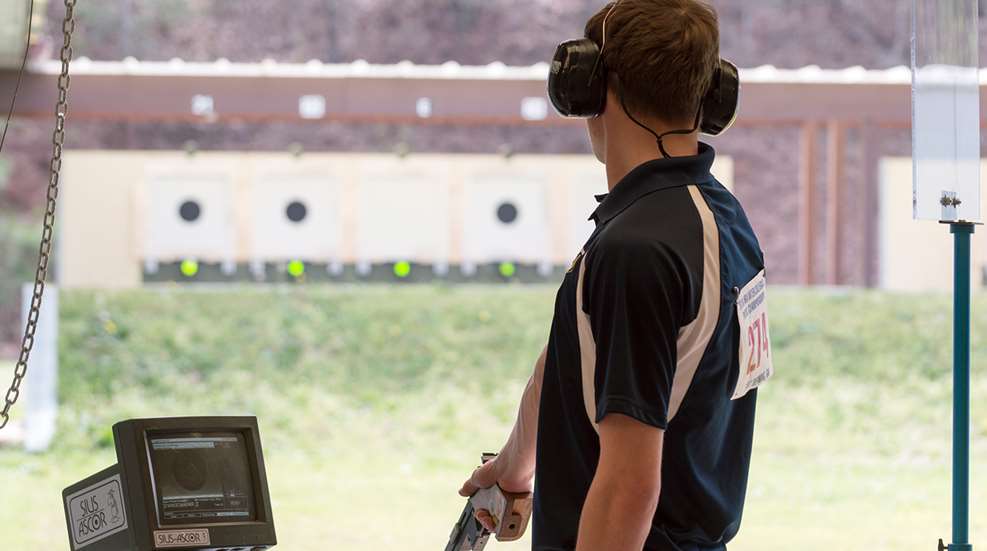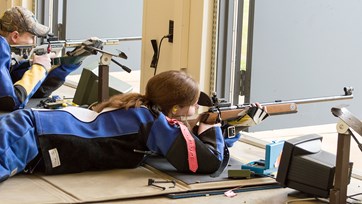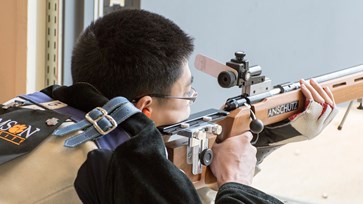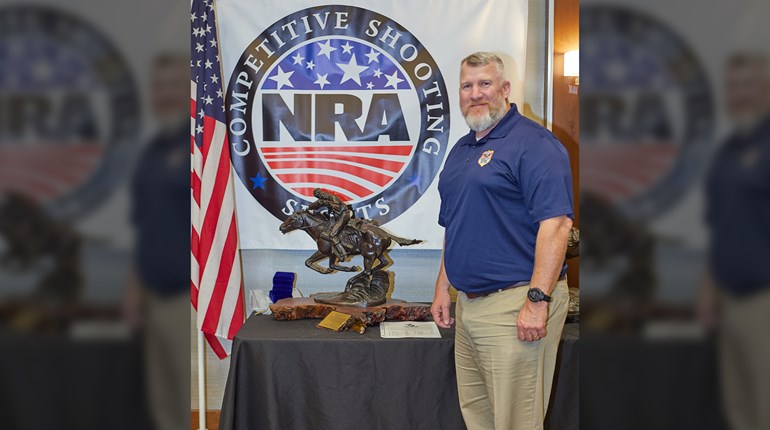** When you buy products through the links on our site, we may earn a commission that supports NRA's mission to protect, preserve and defend the Second Amendment. **

Readers should also check out Dr. Raymond Prior’s previous articles in SSUSA on how to properly set goals, closing a match, and where confidence comes from.
Before continuing to read this article, ask yourself the following questions:
Every athlete, especially sport shooters, benefit from trusting their skills under pressure. Yet, if you ask most athletes what it means to be in a trusting mindset, many have a hard time putting it into words. They’ve felt trust in their skills before and can tell when they weren’t worried while competing, but they struggle to articulate what a trusting mindset is and how to create it. The reason it’s difficult to articulate what it means to be in a trusting mindset is because when an athlete is trusting, there’s not much thinking.
Trust does not come from previous success or from trying to avoid failure. Trust is a result of having a purpose that matches what your skills are designed to do and focusing on where your performance actually happens—the target.
Overall, the brain is incredibly powerful and complex. Without getting into a long lecture on brain structures, action potentials, and neurotransmitters, I will simplify how the brain functions related to performance by dividing it into two mindsets: a thinking mindset and a trusting mindset.
Thinking Mindset
A thinking mindset does exactly what it sounds like it does: it thinks. A thinking mindset is sometimes referred to as the conscious mind. Overall, a thinking mindset creates information and processes the information it receives from the environment. It thinks about the past. It thinks about what may happen in the future. It thinks about consequences. It thinks about other people’s expectations and what they think about you and your performance. A thinking mindset has a tendency to be selective, biased, analytical, and critical.

Most athletes develop a very active thinking mindset because of the belief that ‘thinking more, is better’ is often encouraged in our culture, especially in sport. From the time we begin taking lessons or start being coached, we are often taught to think more about what we are doing and told to “get your head in the game.” When what we are doing doesn’t lead to progress, we’re taught to think harder until we fix something that went wrong. Through this cycle, we develop a strong thinking mindset that has a tendency to try to force performance by over-thinking; as a result, performance tends to get worse and we struggle to make progress.
But a thinking mindset isn’t necessarily bad. In fact, most of the time, a thinking mindset is incredibly valuable. A thinking mindset is what’s allowing you to process the information you’re reading right now. At the right time and place, a thinking mindset is necessary and extremely useful. For example, when you’re practicing a new technical skill, a thinking mindset allows you to make the necessary adjustments to your technique. A thinking mindset is what allows you to make changes to your positions, learn physical skills, and develop strategies for competition. In competition, using a thinking mindset for short periods of time, usually between shots, allows you to make small adjustments and manage your match.
In fact, a thinking mindset is an incredibly valuable tool to athletes, but only when it’s used at the right time. The danger of a thinking mindset is that it has a strong tendency to devote valuable energy and focus to purposes and aspects of your performance that are irrelevant and fulfilling purposes that your shooting skills are not designed for, especially when you are executing your skills.
At any given time you can introduce any number of irrelevant and uncontrollable purposes to your shooting, such as impressing other people, trying to avoid mistakes, or even trying to win a match. To that degree, there are so many different things you can direct your focus to, such as other shooters, shots that have already been taken, or final results. Sometimes it’s important to remember that shooting skills are designed for just that; shooting. They are not designed to impress others or avoid embarrassment. These are only by-products of performance, not the purpose.
Put simply, when we create purposes for our skills that our skills are not designed to do, we are asking ourselves to do something that we cannot control. More often than not the end result is overthinking, anxiety, and fear of making mistakes. Sport shooters can avoid overthinking by remembering that the purpose of a record shot is to simply shoot the best shot you can; that’s it.
Similarly, and this may come as a really obvious statement, we tend to lose control of our performance when we focus on aspects of our performance we cannot control. Things like other shooters, previous shots, future shots, the media, and eventual outcomes are not within our control, and focusing on these things are self-induced distractions. In sum, creating irrelevant purposes and focusing on things we cannot control causes us to think more, making it very difficult to trust our skills to do what they are designed to do.
That’s why having an accurate purpose and focusing where you performance happens is the framework for a trusting mindset. Because there is so much you can think about, it’s vital for athletes to understand that when you are executing your skills in competition—when you are taking a shot, you can and must be in a trusting mindset.
Trusting Mindset
A trusting mindset does exactly what it sounds like it does: it trusts. A trusting mindset is sometimes referred to as the unconscious mind. A trusting mindset is purpose-driven and target focused. In a trusting mindset, an athlete is only thinking about seeing the target and executing skills.

Despite the brain being so complex, the process for performing well, especially under pressure, is very simple. Your body and your mind work together best when you simply see the target and react. For those shooting still targets, keep in mind that seeing and reacting sometimes means taking another hold when you see a hold that won’t produce a good shot. Other times it means pulling the trigger when you see a good hold. For those shooting moving targets, it’s even more vital to be in a trusting mindset because you must be prepared to take a shot when your target is presented.
Regardless of the quality of your hold or how your target is presented, a trusting mindset allows you optimize your skills because your purpose of each and every shot is to simply to shoot the best shot you can and your focus is directed only where you’re performance happens; once again, at your target. This is what makes the trusting mindset ideal for executing skills in competition. It lets your performance happen without interference from additional purposes generated by your ego, heightened emotions, overthinking, and focusing on things you cannot control. In short, it lets your body do what it already knows how to do by thinking only about what your skills are actually designed to do and where they are executed.
Truthfully, every athlete must make efforts to get better and work harder in order to make improvements to their physical skills and there is a time and place to use your thinking mindset to improve as an athlete. But even the best shooters in the world must remember the main objective in shooting is to hit the target, not to have perfect technique or meet the expectations of others.
A trusting mindset is even more important for shooters who are still developing consistent positions. They must resist the temptation to overthink while executing skills in competition. The more you try to think your way to a good shot, the more difficult it will be to shoot the way you want to. The thinking mindset is best when saved for practice, to prepare before a match begins, and to make minor adjustments when needed.
As a sport shooter, keep in mind:
That’s what it means to be in a trusting mindset. A trusting mindset is purpose-driven and target focused. Put simply, being in a trusting mindset means thinking less so you can trust more.
About the Author
Dr. Raymond Prior is the author of Bullseye Mind: Mental Toughness for Sport Shooting. As one of the country’s top peak performance professional, he has nearly a decade of experience educating athletes and coaches about building mental toughness.

Raymond works with athletes, teams, and coaches at professional, Olympic, NCAA, amateur, and youth sport levels. His clients include professional athletes, Olympic gold medalists, individual and team National Champions, National Coach of the Year Award winners, individual and team Conference Champions, and countless NCAA All-Americans in a variety of sports.
Raymond has a firm commitment to growing sport shooting in its many forms and he continues to provide peak performance training to many college shooters and teams including the 18-time National Champion WVU Rifle team, Olympic level shooters domestically and internationally, and shooters of all levels who want to perform more consistently and enjoy shooting more. Visit Dr. Prior’s website at www.rfpsport.com.
Before continuing to read this article, ask yourself the following questions:
- What is the purpose of a record shot (a shot in competition)?
- Where does your performance happen?
- What does it mean to be in a trusting mindset?
Every athlete, especially sport shooters, benefit from trusting their skills under pressure. Yet, if you ask most athletes what it means to be in a trusting mindset, many have a hard time putting it into words. They’ve felt trust in their skills before and can tell when they weren’t worried while competing, but they struggle to articulate what a trusting mindset is and how to create it. The reason it’s difficult to articulate what it means to be in a trusting mindset is because when an athlete is trusting, there’s not much thinking.
Trust does not come from previous success or from trying to avoid failure. Trust is a result of having a purpose that matches what your skills are designed to do and focusing on where your performance actually happens—the target.
Overall, the brain is incredibly powerful and complex. Without getting into a long lecture on brain structures, action potentials, and neurotransmitters, I will simplify how the brain functions related to performance by dividing it into two mindsets: a thinking mindset and a trusting mindset.
Thinking Mindset
A thinking mindset does exactly what it sounds like it does: it thinks. A thinking mindset is sometimes referred to as the conscious mind. Overall, a thinking mindset creates information and processes the information it receives from the environment. It thinks about the past. It thinks about what may happen in the future. It thinks about consequences. It thinks about other people’s expectations and what they think about you and your performance. A thinking mindset has a tendency to be selective, biased, analytical, and critical.

Most athletes develop a very active thinking mindset because of the belief that ‘thinking more, is better’ is often encouraged in our culture, especially in sport. From the time we begin taking lessons or start being coached, we are often taught to think more about what we are doing and told to “get your head in the game.” When what we are doing doesn’t lead to progress, we’re taught to think harder until we fix something that went wrong. Through this cycle, we develop a strong thinking mindset that has a tendency to try to force performance by over-thinking; as a result, performance tends to get worse and we struggle to make progress.
But a thinking mindset isn’t necessarily bad. In fact, most of the time, a thinking mindset is incredibly valuable. A thinking mindset is what’s allowing you to process the information you’re reading right now. At the right time and place, a thinking mindset is necessary and extremely useful. For example, when you’re practicing a new technical skill, a thinking mindset allows you to make the necessary adjustments to your technique. A thinking mindset is what allows you to make changes to your positions, learn physical skills, and develop strategies for competition. In competition, using a thinking mindset for short periods of time, usually between shots, allows you to make small adjustments and manage your match.
In fact, a thinking mindset is an incredibly valuable tool to athletes, but only when it’s used at the right time. The danger of a thinking mindset is that it has a strong tendency to devote valuable energy and focus to purposes and aspects of your performance that are irrelevant and fulfilling purposes that your shooting skills are not designed for, especially when you are executing your skills.
At any given time you can introduce any number of irrelevant and uncontrollable purposes to your shooting, such as impressing other people, trying to avoid mistakes, or even trying to win a match. To that degree, there are so many different things you can direct your focus to, such as other shooters, shots that have already been taken, or final results. Sometimes it’s important to remember that shooting skills are designed for just that; shooting. They are not designed to impress others or avoid embarrassment. These are only by-products of performance, not the purpose.
Put simply, when we create purposes for our skills that our skills are not designed to do, we are asking ourselves to do something that we cannot control. More often than not the end result is overthinking, anxiety, and fear of making mistakes. Sport shooters can avoid overthinking by remembering that the purpose of a record shot is to simply shoot the best shot you can; that’s it.
Similarly, and this may come as a really obvious statement, we tend to lose control of our performance when we focus on aspects of our performance we cannot control. Things like other shooters, previous shots, future shots, the media, and eventual outcomes are not within our control, and focusing on these things are self-induced distractions. In sum, creating irrelevant purposes and focusing on things we cannot control causes us to think more, making it very difficult to trust our skills to do what they are designed to do.
That’s why having an accurate purpose and focusing where you performance happens is the framework for a trusting mindset. Because there is so much you can think about, it’s vital for athletes to understand that when you are executing your skills in competition—when you are taking a shot, you can and must be in a trusting mindset.
Trusting Mindset
A trusting mindset does exactly what it sounds like it does: it trusts. A trusting mindset is sometimes referred to as the unconscious mind. A trusting mindset is purpose-driven and target focused. In a trusting mindset, an athlete is only thinking about seeing the target and executing skills.

Despite the brain being so complex, the process for performing well, especially under pressure, is very simple. Your body and your mind work together best when you simply see the target and react. For those shooting still targets, keep in mind that seeing and reacting sometimes means taking another hold when you see a hold that won’t produce a good shot. Other times it means pulling the trigger when you see a good hold. For those shooting moving targets, it’s even more vital to be in a trusting mindset because you must be prepared to take a shot when your target is presented.
Regardless of the quality of your hold or how your target is presented, a trusting mindset allows you optimize your skills because your purpose of each and every shot is to simply to shoot the best shot you can and your focus is directed only where you’re performance happens; once again, at your target. This is what makes the trusting mindset ideal for executing skills in competition. It lets your performance happen without interference from additional purposes generated by your ego, heightened emotions, overthinking, and focusing on things you cannot control. In short, it lets your body do what it already knows how to do by thinking only about what your skills are actually designed to do and where they are executed.
Truthfully, every athlete must make efforts to get better and work harder in order to make improvements to their physical skills and there is a time and place to use your thinking mindset to improve as an athlete. But even the best shooters in the world must remember the main objective in shooting is to hit the target, not to have perfect technique or meet the expectations of others.
A trusting mindset is even more important for shooters who are still developing consistent positions. They must resist the temptation to overthink while executing skills in competition. The more you try to think your way to a good shot, the more difficult it will be to shoot the way you want to. The thinking mindset is best when saved for practice, to prepare before a match begins, and to make minor adjustments when needed.
As a sport shooter, keep in mind:
- The purpose of a record shot is to shoot the best shot you can; that’s it.
- Your performance happens at your target.
- The body and brain work together best when we simply see and react.
That’s what it means to be in a trusting mindset. A trusting mindset is purpose-driven and target focused. Put simply, being in a trusting mindset means thinking less so you can trust more.
About the Author
Dr. Raymond Prior is the author of Bullseye Mind: Mental Toughness for Sport Shooting. As one of the country’s top peak performance professional, he has nearly a decade of experience educating athletes and coaches about building mental toughness.

Raymond works with athletes, teams, and coaches at professional, Olympic, NCAA, amateur, and youth sport levels. His clients include professional athletes, Olympic gold medalists, individual and team National Champions, National Coach of the Year Award winners, individual and team Conference Champions, and countless NCAA All-Americans in a variety of sports.
Raymond has a firm commitment to growing sport shooting in its many forms and he continues to provide peak performance training to many college shooters and teams including the 18-time National Champion WVU Rifle team, Olympic level shooters domestically and internationally, and shooters of all levels who want to perform more consistently and enjoy shooting more. Visit Dr. Prior’s website at www.rfpsport.com.


































